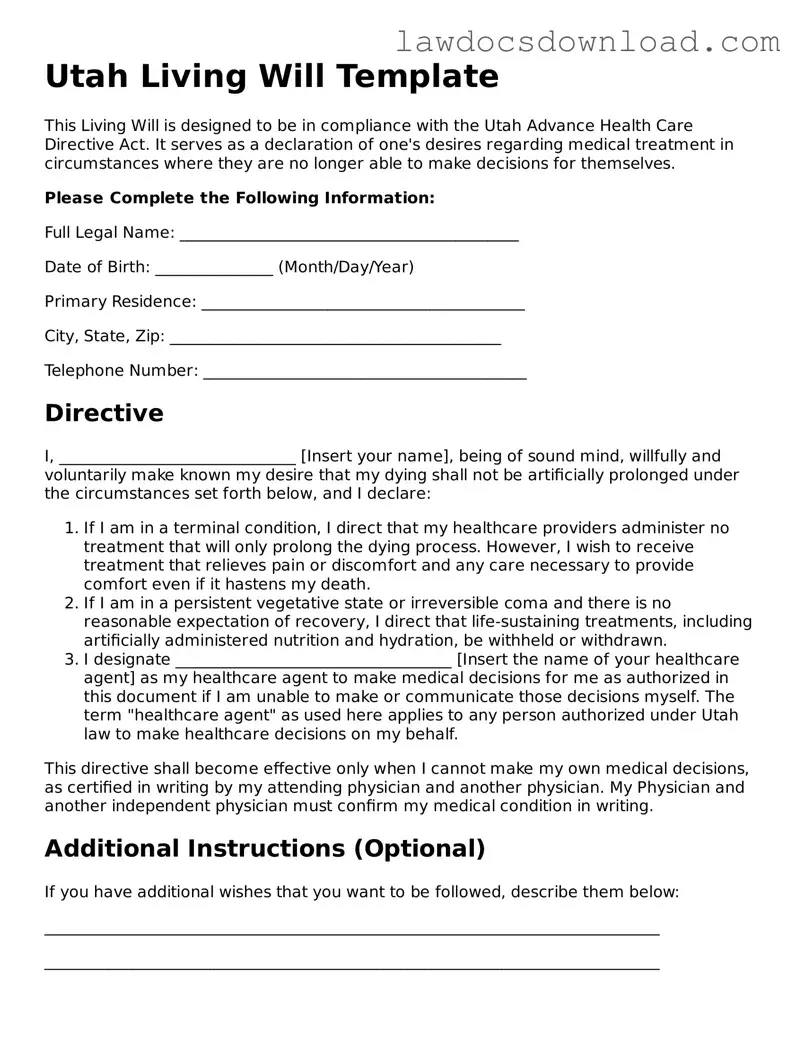Utah Living Will Template
This Living Will is designed to be in compliance with the Utah Advance Health Care Directive Act. It serves as a declaration of one's desires regarding medical treatment in circumstances where they are no longer able to make decisions for themselves.
Please Complete the Following Information:
Full Legal Name: ___________________________________________
Date of Birth: _______________ (Month/Day/Year)
Primary Residence: _________________________________________
City, State, Zip: __________________________________________
Telephone Number: _________________________________________
Directive
I, ______________________________ [Insert your name], being of sound mind, willfully and voluntarily make known my desire that my dying shall not be artificially prolonged under the circumstances set forth below, and I declare:
- If I am in a terminal condition, I direct that my healthcare providers administer no treatment that will only prolong the dying process. However, I wish to receive treatment that relieves pain or discomfort and any care necessary to provide comfort even if it hastens my death.
- If I am in a persistent vegetative state or irreversible coma and there is no reasonable expectation of recovery, I direct that life-sustaining treatments, including artificially administered nutrition and hydration, be withheld or withdrawn.
- I designate ___________________________________ [Insert the name of your healthcare agent] as my healthcare agent to make medical decisions for me as authorized in this document if I am unable to make or communicate those decisions myself. The term "healthcare agent" as used here applies to any person authorized under Utah law to make healthcare decisions on my behalf.
This directive shall become effective only when I cannot make my own medical decisions, as certified in writing by my attending physician and another physician. My Physician and another independent physician must confirm my medical condition in writing.
Additional Instructions (Optional)
If you have additional wishes that you want to be followed, describe them below:
______________________________________________________________________________
______________________________________________________________________________
Signatures
By signing below, I indicate my understanding and agreement with the stated choices in this Living Will.
Signature: ____________________________________ Date: ________________
Print Name: ____________________________________
Witness #1 Signature: _________________________________ Date: ________________
Print Name: _____________________________________________________________
Statement of Witness: I declare that the person signing this document is personally known to me, that they signed or acknowledged their signature on this document in my presence, and that they appear to be of sound mind and under no duress, fraud, or undue influence.
Witness #2 Signature: _________________________________ Date: ________________
Print Name: _____________________________________________________________
Statement of Witness: I declare that the criteria for the first witness are met, and also that I am not related to the declarant by blood, marriage, or adoption, and, to the best of my knowledge, I am not entitled to any part of the estate of the declarant upon their decease under a will now existing or by operation of law.

